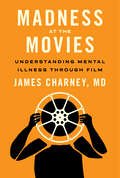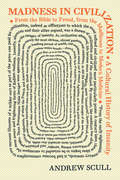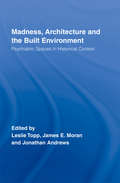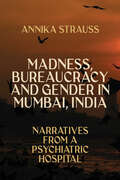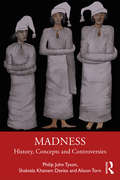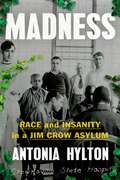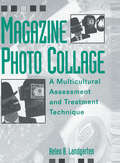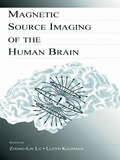- Table View
- List View
Madness at Home: The Psychiatrist, the Patient, and the Family in England, 1820-1860
by Akihito SuzukiThis study, painting a fascinating picture of how families viewed and managed madness, suggests that the family actually played a critical role in caring for the insane and in the development of psychiatry itself. It includes several fascinating case histories, press reports of formal legal declarations of insanity and provides an illuminating historical perspective on our own day and age, when the mentally ill are mainly treated in home and community.
Madness at the Movies: Understanding Mental Illness through Film
by James CharneyA unique exploration of how mental illness is portrayed in classic and contemporary films.The study of classic and contemporary films can provide a powerful avenue to understand the experience of mental illness. In Madness at the Movies, James Charney, MD, a practicing psychiatrist and long-time cinephile, examines films that delve deeply into characters' inner worlds, and he analyzes moments that help define their particular mental illness. Based on the highly popular course that Charney taught at Yale University and the American University of Rome, Madness at the Movies introduces readers to films that may be new to them and encourages them to view these films in an entirely new way. Through films such as Psycho, Taxi Driver, Through a Glass Darkly, Night of the Hunter, A Woman Under the Influence, Ordinary People, and As Good As It Gets, Charney covers an array of disorders, including psychosis, paranoia, psychopathy, depression, bipolar disorder, obsessive-compulsive disorder, and anxiety. He examines how these films work to convey the essence of each illness. He also looks at how each film reflects the understanding of mental illness at the time it was released as well as the culture that shaped that understanding.Charney explains how to observe the behaviors displayed by characters in the films, paying close attention to signs of mental illness. He demonstrates that learning to read a film can be as absorbing as watching one. By viewing these films through the lens of mental health, readers can hone their observational skills and learn to assess the accuracy of depictions of mental illness in popular media.
Madness in Civilization
by Andrew ScullThe loss of reason, a sense of alienation from the commonsense world we all like to imagine we inhabit, the shattering emotional turmoil that seizes hold and won't let go--these are some of the traits we associate with madness. Today, mental disturbance is most commonly viewed through a medical lens, but societies have also sought to make sense of it through religion or the supernatural, or by constructing psychological or social explanations in an effort to tame the demons of unreason. Madness in Civilization traces the long and complex history of this affliction and our attempts to treat it.Beautifully illustrated throughout, Madness in Civilization takes readers from antiquity to today, painting a vivid and often harrowing portrait of the different ways that cultures around the world have interpreted and responded to the seemingly irrational, psychotic, and insane. From the Bible to Sigmund Freud, from exorcism to mesmerism, from Bedlam to Victorian asylums, from the theory of humors to modern pharmacology, the book explores the manifestations and meanings of madness, its challenges and consequences, and our varied responses to it. It also looks at how insanity has haunted the imaginations of artists and writers and describes the profound influence it has had on the arts, from drama, opera, and the novel to drawing, painting, and sculpture.Written by one of the world's preeminent historians of psychiatry, Madness in Civilization is a panoramic history of the human encounter with unreason.
Madness in Cold War America: Mad America (Routledge Studies in Cultural History)
by Alexander DunstThis book tells the story of how madness came to play a prominent part in America’s political and cultural debates. It argues that metaphors of madness rise to unprecedented popularity amidst the domestic struggles of the early Cold War and become a pre-eminent way of understanding the relationship between politics and culture in the United States. In linking the individual psyche to society, psychopathology contributes to issues central to post-World War II society: a dramatic extension of state power, the fate of the individual in bureaucratic society, the political function of emotions, and the limits to admissible dissent. Such vocabulary may accuse opponents of being crazy. Yet at stake is a fundamental error of judgment, for which madness provides welcome metaphors across US diplomacy and psychiatry, social movements and criticism, literature and film. In the process, major parties and whole historical eras, literary movements and social groups are declared insane. Reacting against violence at home and war abroad, countercultural authors oppose a sane madness to irrational reason—romanticizing the wisdom of the schizophrenic and paranoia’s superior insight. As the Sixties give way to a plurality of lifestyles an alternative vision arrives: of a madness now become so widespread and ordinary that it may, finally, escape pathology.
Madness in Experience and History: Merleau-Ponty’s Phenomenology and Foucault’s Archaeology (Psychology and the Other)
by Hannah Lyn VenableMadness in Experience and History brings together experience and history to show their impact on madness or mental illness. Drawing on the writings of two twentieth-century French philosophers, Maurice Merleau-Ponty and Michel Foucault, the author pairs a phenomenological approach with an archaeological approach to present a new perspective on mental illness as an experience that arises out of common behavioral patterns and shared historical structures. Many today feel frustrated with the medical model because of its deficiencies in explaining mental illness. In response, the author argues that we must integrate human experiences of mental disorders with the history of mental disorders to have a full account of mental health and to make possible a more holistic care.Scholars in the humanities and mental health practitioners will appreciate how such an analysis not only offers a greater understanding of mental health, but also a fresh take on discovering value in diverse human experiences.
Madness or Knowing the Unbearable Truth: A Psychoanalytic Journey in Search of Sanity
by Tova ZaltzThe Impossible Choice offers readers a narrative of the relationship between a therapist and her patient who desperately wants to discover her past. With no memory and no way of knowing what was real, her long therapeutic journey was to last 26 years, half her lifetime. Her only reality was the life she lived in the presence of her therapist. The narrative unfolds to reveal a story of horrific events that must be hidden, yet can no longer be kept secret. It sheds light on how chronic long-term traumatisation within a closed family circle can create madness in a vulnerable and lonely child, and helps reader gain an understanding of the enigmatic phenomena of Dissociated Identity Disorder. Having been terrorized into silence, destroying her ability to use language in a house of secrets and lies, the therapy reveals how this patient struggles to come out of her autistic-like state in search of ways to find her past, her ‘self’ and her voice. In this struggle, the reader becomes an audience exposed to the birth of dissociative personae who come forth to tell her story. As language slowly unfolds, she begins to share a first-hand account, albeit in written form, of the most complex psychological forces involved in a victim of incest who simultaneously loves, hates and is terrorized by her lover-father. Through live vignettes it demonstrates how external violence can create inner violence that threatens to annihilate the soul, leaving only a body to survive. The book provides an original contribution to our understanding of the complex psychological forces involved in incest, featuring the patient’s own, coherent written texts, mediated by her therapist. The former’s remarkable insights represent essential reading for all readers involved in policy development for the protection of children at high risk of suffering abuse.
Madness, Architecture and the Built Environment: Psychiatric Spaces in Historical Context (Routledge Studies in the Social History of Medicine)
by Leslie Topp; James E. Moran; Jonathan AndrewsThis is the first volume of papers devoted to an examination of the relationship between mental health/illness and the construction and experience of space. This historical analysis with contributions from leading experts will enlighten and intrigue in equal measure. The first rigorous scholarly analysis of its kind in book form, it will be of particular interest to the history, psychiatry and architecture communities.
Madness, Bureaucracy and Gender in Mumbai, India: Narratives from a Psychiatric Hospital
by Annika StraussRegional mental hospitals in India are perceived as colonial artefacts in need of reformation. In the last two decades, there has been discussion around the maltreatment of patients, corruption and poor quality of mental health treatment in these institutions. This ethnography scrutinizes the management of madness in one of these asylum-like institutions in the context of national change and the global mental health movement. The author explores the assembling and impact of psychiatric, bureaucratic, gendered and queer narratives in and around the hospital. Finally, the author attempts to reconcile social anthropology and psychiatry by scrutinising their divergent approaches towards ‘mad narratives’.
Madness, Disability and Social Exclusion: The Archaeology and Anthropology of 'Difference'
by Jane HubertA unique work that brings together a broad range of specialist disciplines to create a new perspective on social and physical exclusion from society. Brings a much needed comparative approach to the subject of disability. Confinement, hermaphrodites, killing of disabled children, leprosy, deafness, and funerary rituals are explored.
Madness, Violence, and Power: A Critical Collection
by Peter Beresford Andrea Daley Lucy CostaMadness, Violence, and Power: A Critical Collection disengages from the common forms of discussion about violence related to mental health service users and survivors which position those users or survivors as more likely to enact violence or become victims of violence. Instead, this book seeks to broaden understandings of violence manifest in the lives of mental health service users/survivors, ‘push’ current considerations to explore the impacts of systems and institutions that manage ‘abnormality’, and to create and foster space to explore the role of our own communities in justice and accountability dialogues. This critical collection constitutes an integral contribution to critical scholarship on violence and mental illness by addressing a gap in the existing literature by broadening the “violence lens,” and inviting an interdisciplinary conversation that is not narrowly biomedical and neuro-scientific.
Madness: A Bipolar Life
by Marya HornbacherWhen Marya Hornbacher published her first book, Wasted: A Memoir of Anorexia and Bulimia, she did not yet know the reason for her all-but-shattered young life. At age twenty-four, Hornbacher was diagnosed with Type 1 rapid-cycle bipolar, the most severe form of bipolar disease there is. <P><P> In Madness, in her trademark wry and utterly self-revealing voice, Hornbacher tells her new story. Through scenes of astonishing visceral and emotional power, she takes us inside her own desperate attempts to control violently careening mood swings by self-starvation, substance abuse, numbing sex, and self-mutilation. How Hornbacher fights her way up from a madness that all but destroys her, and what it is like to live in a difficult and sometimes beautiful life and marriage-where bipolar always beckons-is at the heart of this brave and heart-stopping memoir.
Madness: A Bipolar Life
by Marya HornbacherIn the vein of An Unquiet Mind comes a storm of a memoir that will take you deep inside bipolar disorder and change everything you know. When Marya Hornbacher published her first book, Wasted: A Memoir of Anorexia and Bulimia, she did not yet have the piece of shattering knowledge that would finally make sense of the chaos of her life. At age twenty-four, Hornbacher was diagnosed with Type I rapid-cycle bipolar, the most severe form of bipolar disorder. In Madness, in her trademark wry and utterly self-revealing voice, Hornbacher tells her new story. Through scenes of astonishing visceral and emotional power, she takes us inside her own desperate attempts to counteract violently careening mood swings by self-starvation, substance abuse, numbing sex, and self-mutilation. How Hornbacher fights her way up from a madness that all but destroys her, and what it is like to live in a difficult and sometimes beautiful life and marriage—where bipolar always beckons—is at the center of this brave and heart-stopping memoir.Madness delivers the revelation that Hornbacher is not alone: millions of people in America today are struggling with a variety of disorders that may disguise their bipolar disease. And Hornbacher's fiercely self-aware portrait of her own bipolar as early as age four will powerfully change, too, the current debate on whether bipolar in children actually exists. New York Times&“Humorous, articulate, and self-aware…A story that is almost impossible to put down.&”— &“With the same intimately revelatory and shocking emotional power that marked [Wasted], Hornbacher guides us through her labyrinth of psychological demons.&”—Elle
Madness: History, Concepts and Controversies
by Philip John Tyson Shakiela Khanam Davies Alison TornMadness: History, Concepts and Controversies provides a comprehensive and critical analysis of current perspectives on mental illness and how they have been shaped by historical trends and dominant sociocultural paradigms. From its representation among world religions and wider folkloric myth, to early attempts to rationalize and treat symptoms of mental disorder, this book outlines the principle contemporary models of understanding mental health and situates them within a wider historical and social context. The authors consider a variety of current controversies within the mental health arena and provide numerous pedagogical features to allow students the opportunity to understand and engage in current issues and debates relating to psychological disorders. By discussing key issues such as the social construction of mental illness, this text provides an essential overview of how societies and science has understood mental illness, and will appeal to students, researchers and general readers alike.
Madness: Ideas About Insanity
by Peter MorrallThis book is an introduction to the uncertainties and incongruities about madness. It is aimed at all of those who are curious about this subject whether out of general inquisitiveness or because it is part of a formal course of study. Using case studies of real people in order to explain, humanise, and bring to life the subject, Peter Morrall critically analyses how madness has been and is understood, or perhaps misunderstood. By contrasting past and present people who have been perceived as mad and/or perceive themselves as mad, Morrall presents core ideas about madness and critiques their would-be robustness in explaining the specific madness of the person in question, as well as their general relevance to madness overall. Unlike many of its contemporaries, the book does not adhere to a perspective,but rather remains skeptical about the ideas of all who profess to understandmadness, whether these emanate from sociology, psychology, psychotherapy,anthropology, ‘anti’ psychiatry, or the biological sciences of contemporary‘scientific-psychiatry’. This book will inform and stimulate the thinking of the reader, and challenge those with preconceived ideas about madness.
Madness: Race and Insanity in a Jim Crow Asylum
by Antonia HyltonIn the tradition of The Immortal Life of Henrietta Lacks, this New York Times bestseller is a page-turning account of one of the nation&’s last segregated asylums..."a book that left me breathless" (Clint Smith). For centuries, Black patients have been absent from our history books. Madness transports readers through the ninety-three-year history of Crownsville Hospital, one of the last segregated asylums with surviving records and a campus that still stands to this day in Anne Arundel County, Maryland. Antonia Hylton blends the intimate tales of patients and employees whose lives were shaped by Crownsville with a decade-worth of investigative research and archival documents. Madness chronicles the stories of Black families whose mental health suffered as they tried, and sometimes failed, to find safety and dignity. Hylton also grapples with her own family&’s experiences with mental illness, and the secrecy and shame that it reproduced for generations. As Crownsville Hospital grew from an antebellum-style work camp to a tiny city sitting on 1,500 acres, the institution became a microcosm of America&’s evolving battles over slavery, racial integration, and civil rights. Hylton traces the legacy of slavery to the treatment of Black people&’s bodies and minds in our current mental healthcare system. It is a captivating and heartbreaking meditation on how America decides who is sick or criminal, and who is worthy of our care or irredeemable.
Magazine Photo Collage: A Multicultural Assessment And Treatment Technique
by Helen B. LandgartenFirst published in 1994. Routledge is an imprint of Taylor & Francis, an informa company.
Magic Season: A Son's Story
by Wade Rouse"Honest, authentic, heartbreaking and healing. I devoured it in one day."—Jenny Lawson, #1 New York Times bestselling author Bestselling author Wade Rouse finds solace with his dying father through their shared love of baseball in this poignant, illuminating memoir of family and forgiveness.Before his success in public relations, his loving marriage and his storied writing career, Wade Rouse was simply Ted Rouse's son. A queer kid in a conservative Ozarks community, Wade struggled at a young age to garner his father's approval and find his voice. For his part, Ted was a hard-lined engineer, offering little emotional support or encouragement. But Wade and Ted had one thing in common: an undying love of the St. Louis Cardinals.For decades, baseball offered Wade and his father a shared vocabulary—a way to stay in touch, to connect and to express their emotions. But when his father's health takes a turn for the worst, Wade returns to southwest Missouri to share one final season with his father. As the Cards race towards a dramatic pennant race, Wade and his father begin to open up in way they never thought possible. Together, inning by inning during their own magic season, they'll move towards forgiveness, reconciliation, and peace.Heartfelt, hilarious and lovingly rendered, Magic Season is an unforgettable story of love, family and forgiveness against the backdrop of America's favorite pastime.
Magic Words
by Jonah BergerA NEXT BIG IDEA CLUB 'MUST-READ'New York Times bestselling author Jonah Berger’s cutting-edge research reveals how six types of words can increase your impact in every area of life: from persuading others and building stronger relationships, to boosting creativity and motivating teams.Almost everything we do involves words. Words are how we persuade, communicate, and connect. They’re how leaders lead, salespeople sell, and parents parent. They’re how teachers teach, policymakers govern, and doctors explain. Even our private thoughts rely on language.But certain words are more impactful than others. They’re better at changing minds, engaging audiences, and driving action. What are these magic words, and how can we take advantage of their power?In Magic Words, internationally bestselling author Jonah Berger gives you an inside look at the new science of language and how you can use it. Technological advances in machine learning, computational linguistics, and natural language processing, combined with the digitization of everything from cover letters to conversations, have yielded unprecedented insights.Learn how salespeople convince clients, lawyers persuade juries, and storytellers captivate audiences; how teachers get kids to help and service representatives increase customer satisfaction; how startup founders secure funding, musicians make hits, and psychologists identified a Shakespearean manuscript without ever reading a play.This book is designed for anyone who wants to increase their impact. It provides a powerful toolkit and actionable techniques that can lead to extraordinary results. Whether you’re trying to persuade a client, motivate a team, or get a whole organization to see things differently, this book will show you how to leverage the power of magic words.
Magic Words: How to Get What You Want from a Narcissist
by Lindsey EllisonPower Play: Out Smart, Out Maneuver and Utterly Confound a Narcissist. If you are locked into a relationship with a narcissist, such as an employer, a high conflict partner, an ex-spouse with shared custody, or perhaps a family member, this book is for you. Based upon years of research and experience coaching victims of narcissistic abuse, Lindsey Ellison has masterminded a communication strategy that will allow you to protect your interests without conflict or drama. Lindsey has created a deft, intelligently-crafted script you can use to neutralize the power struggle. Her practical, step-by-step guide offers simple, yet life-changing strategies that inspire cooperation. This book provides templates for communication that deescalate and neutralize previously combative and emotionally-charged exchanges. Whether you communicate via text, e-mail, or in-person, “MAGIC Words” will offer you the chance to influence the dynamic between you and your narcissist for the better.
Magic or Madness (Magic or Madness, Book #1)
by Justine LarbalestierReason has lived fifteen years in the Australian outback with her mother, Sarafina, They're on the run from Reason's grandmother Esmeralda, who believes in magic and practices horrifying dark rituals. But when Sarafina suffers a mental breakdown, Reason is sent to the one place she fears most--'Esmeralda's home in Sydney. Nothing about the house or Esmeralda is what Reason expected. For the first time she finds herself questioning her mother's teachings. Then, when she walks through Esmeralda's back door in Sydney and finds herself on a New York City street, Reason is forced to face the shocking truth. magic is real. And Reason is magic. The first book in Justine Larbalestier's thrilling trilogy brings readers from one country to another and through revelation upon revelation, leading to Reason's ultimate discovery of the price she must pay for the magic that lives in her blood.
Magic, Madness, and Mischief
by Kelly McCulloughFrom the author of School for Sidekicks comes a witty and thoughtful middle-grade fantasy about the bonds of family and the strength of true friendship. Kalvan Monroe is worried. Either he’s going mad or he really did wake up with uncontrollable fire magic and accidentally summon a snarky talking fire hare. (Yes, that’s right, a hare. Made of fire. That talks.) He’s got to be going crazy, right? But if he’s not, then magic actually is real, and he’s got even more problems to worry about. Because Kalvan isn’t the only one with powers. The same fire magic that allows him to talk his way into and out of trouble burned too brightly in his mother, damaging her mind and leaving her vulnerable to the cold, manipulative spells of the Winter King. Can Kalvan gain control of his power in time to save his mother, or will their fires be snuffed out forever?Kelly McCullough combines Magic, Madness, and Mischief--as well as danger--in a delightful fantasy set in a magical version of St. Paul, Minnesota.
Magical Use of Thought Forms: A Complete System for Mental & Spiritual Empowerment
by Dolores Ashcroft-Nowicki J. H. BrennanMost of magical development is the training of the will through visualization. In this book, the authors give techniques never before published which guide the user in using the astral plain to create a memory palous, create gardians for their house, and other such useful tools.
Magnetic Partners
by Stephen BetchenDo you and your partner argue about the same things over and over again? Are you often confused about why your partner is so angry with you? Are things getting worse and worse even though you've tried everything you can think of to make them better? In this breakthrough guide to repairing romantic relationships, therapist and marriage researcher Dr. Stephen Betchen presents a powerful new explanation of what leads to this kind of escalating conflict in couples and how you can repair your relationship and find a whole new level of happiness. Based on his extensive experience as a couples' therapist, Dr. Betchen has discovered that the prevailing idea that opposites attract is wrong. Instead, one of the strongest forces that attracts people to one another is that they share a hidden, inner conflict in their lives--an unconscious struggle within themselves that each of them developed growing up--which he calls a "master conflict." The fact that a couple shares a master conflict acts as an almost magnetic force of attraction, but, over time, master conflicts often begin to push a pair apart--many of the very things you most appreciated about each other start to grate on you, producing increasing hostility. The good news is that by identifying the master conflict that you share, you and your partner can take the steps to break the cycle of fighting and come to a new place of understanding and happiness in your relationship. Often, just the realization that you have this hidden conflict acts as a powerful cure, allowing you to appreciate each other once again and to be empathetic about the things that have been irritating you both. From his years of work with couples, Betchen has identified the nineteen most common master conflicts--such as getting your needs met vs. caretaking; giving vs. withholding; commitment vs. freedom; power vs. passivity--and for each he provides vivid stories of couples who have struggled with them, as well as simple tests that help you to: * Identify the core master conflict that is causing your relationship problems * Understand the origins of your conflict and how it drew you to your partner* Diagnose how the conflict is now pushing you apart * Come to new terms with the conflict to save your relationshipAs Dr. Betchen writes, knowledge of a master conflict is power, and Magnetic Partners is an empowering guide that will help you not only to identify and control your master conflict, but also to bring your relationship to a new level based on deeper understanding, ultimately leading to greater fulfillment and long-term resilience. Partners
Magnetic Source Imaging of the Human Brain
by Lloyd Kaufman Zhong-Lin LuThis book is designed to acquaint serious students, scientists, and clinicians with magnetic source imaging (MSI)--a brain imaging technique of proven importance that promises even more important advances. The technique permits spatial resolution of neural events on a scale measured in millimeters and temporal resolution measured in milliseconds. Although widely mentioned in literature dealing with cognitive neuroscience and functional brain imaging, there is no single book describing both the foundations and actual methods of magnetoencephalopgraphy and its underlying science, neuromagnetism. This volume fills a long-standing need, as it is accessible to scientists and students having no special background in the field, and makes it possible for them to understand this literature and undertake their own research. A self-contained unit, this book covers MSI from beginning to end, including its relationship to allied technologies, such as electroencephalography and modern functional imaging modalities. In addition, the book: *introduces the field to the non-specialist, providing a framework for the rest of the book; *provides a thorough review of the physiological basis of MSI; *describes the mathematical bases of MSI--the forward and inverse problems; *outlines new signal processing methods that extract information from single-trial MEG; *depicts the early, as well as the most recent versions of MSI technology; *compares MSI with other imaging methodologies; *describes new paradigms and analysis techniques in applying MSI to study human perception and cognition, which are also applicable to EEG; and *reviews some of the most important results in MSI from the most prominent researchers and laboratories around the world.
Magnetized: Conversations with a Serial Killer
by Carlos BusquedA "haunting and unsettling" psychological portrait for readers of true crime classics such as My Dark Places, The Stranger Beside Me, and I&’ll Be Gone In the Dark, one of Argentina&’s most innovative writers brings to life the story of a serial killer who, in 1982, murdered four taxi drivers without any apparent motive (NPR, One of the Best Books of the Year).Over the course of one ghastly week in September 1982, the bodies of four taxi drivers were found in Buenos Aires, each murder carried out with the same cold precision. The assailant: a nineteen–year–old boy, odd and taciturn, who gave the impression of being completely sane. But the crimes themselves were not: four murders, as exact as they were senseless.More than thirty years later, Argentine author Carlos Busqued began visiting Ricardo Melogno, the serial killer, in prison. Their conversations return to the nebulous era of the crimes and a story full of missing pieces. The result is a book at once hypnotic and unnerving, constructed from forensic documents, newspaper clippings, and interviews with Melogno himself. Without imposing judgment, Busqued allows for the killer to describe his way of retreating from the world and to explain his crimes as best he can. In his own words, Melogno recalls a visit from Pope Francis, grim depictions of daily life in prison, and childhood remembrances of an unloving mother who drove her son to Brazil to study witchcraft. As these conversations progress, the focus slowly shifts from the crimes themselves, to Melogno&’s mistreatment and mis–diagnosis while in prison, to his current fate: incarcerated in perpetuity despite having served his full sentence.Using these personal interviews, alongside forensic documents and newspaper clippings, Busqued crafted Magnetized, a captivating story about one man&’s crimes, and a meditation on how one chooses to inhabit the world, or to become absent from it.

